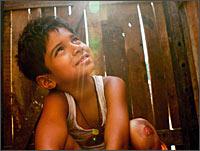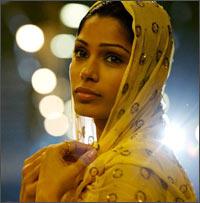You know a director is a true master when he can turn shit into dreams.
And if a man can do it twice over, he's a true bloody genius.
In Danny Boyle's 1996 masterpiece Trainspotting, Ewan McGregor's Renton pours himself disgustingly yet poetically through the worst toilet in Scotland for a handful of pills. The search goes from squalid to surreal as the filth is scavenged and the pills found, and for a brief hold-your-breath moment, the film becomes a beautiful ode to joy, before the patently polluted protagonist emerges into harsh reality.
In Slumdog Millionaire, Boyle's latest masterpiece, pint-sized Jamal Malik (played by a marvellous Ayush Mahesh Khedekar) finds himself barricaded inside a messy Mumbai latrine with all thoughts of his own constipation forgotten in a starry haze. The lord God Amitabh Bachchan is descending, via helicopter, into the slums for a brief moment, and our irresistible urchin is a huge fan. Images of Coolie dance before his desperate eyes, he briefly contemplates the pile of excrement below, and jumps -- right into the mess.
 Standing up like a swamp monster -- only a hundred times more disgusting -- this creature covered in the goo of strangers holds up a picture of his idol and, repeatedly yelling 'Amitabachchan' as one word, makes his way through a frenzied mob, one that backs away at the sight of this scummy fanboy. Renton hunted for a hit while Jamal hunts for the greatest hitmaker in the land, and his triumphant instant of glory -- when we see that mythic left-hand scribble an autograph just for him -- is an immortal one, reminding us just how magical cinema can be.
Standing up like a swamp monster -- only a hundred times more disgusting -- this creature covered in the goo of strangers holds up a picture of his idol and, repeatedly yelling 'Amitabachchan' as one word, makes his way through a frenzied mob, one that backs away at the sight of this scummy fanboy. Renton hunted for a hit while Jamal hunts for the greatest hitmaker in the land, and his triumphant instant of glory -- when we see that mythic left-hand scribble an autograph just for him -- is an immortal one, reminding us just how magical cinema can be.
The film tells us the story of this very Jamal Malik, who at 18 has cleaned up to become a call-center chaiwallah capturing India's imagination by occupying the Who Wants To Be A Millionaire? hot-seat with unbelievable accuracy. He seems to know every answer in the book, a fact that leads gleefully smarmy show host Prem to calls the cops on him on charges of cheating. The film thus begins with the cops torturing Jamal, but there is only that much of the saala slumdog they can resist as he spins them his tale, and it truly is a tale of wonder.
Loosely based on Vikas Swarup's novel Q&A, Simon Beaufoy's script uses coincidences instead of commas and weaves a grand drama, a fantabulous reality-mocking story, of love and of loss, of survival and of sweethearts. It is a Dickensian tale set in a merciless, mesmerizing city with no time for minor detailing quibbles, with characters speaking not as they naturally would but as the madcap narrative demands, and reality itself breathlessly bending over backwards to accommodate the frenzied energy of Anthony Dod Mantle's disarmingly honest camera.
By itself, the story -- set firmly in happenstance and high drama, in fantasy and formula -- could be just another piece of overbearing Bollywood kitsch, but Boyle takes it into his spirited hands and plays havoc, clearly relishing every bit of the high-intensity experience. A third of the film is in Hindi (co-director Loveleen Tandon has kept things impressively real) and Boyle uses up subtitles with delightful whimsy, bobbing about like unobtrusive comic-book speech bubbles instead of stagnating at the bottom of the screen. The result is an exceptionally dynamic energy that gels right into the film's rabid groove, urging the narrative forward even more.
 The ensemble cast is uniformly pitch-perfect. Dev Patel is wonderfully woeful as the grown up Jamal, breaking into a smile only as he answers his final question in the film's climax, but young Khedekar pretty much outshines him as tiny Jamal, while Tanay Chheda's middle Jamal does rather well too.
The ensemble cast is uniformly pitch-perfect. Dev Patel is wonderfully woeful as the grown up Jamal, breaking into a smile only as he answers his final question in the film's climax, but young Khedekar pretty much outshines him as tiny Jamal, while Tanay Chheda's middle Jamal does rather well too.
Jamal's brother Salim is played likewise by a trio of three (chronologically: Azharuddin Mohammed Ismail, Ashutosh Lobo Gajiwala and Madhur Mittal), the performances going from strength to strength.
Frieda Pinto's grown up Latika has a wonderful smile, but the true meat of her character's part lies with her youngest version played by Rubiana Ali, while Tanvi Ganesh Lonkar's middle Latika has the most haunting moments.
Irrfan Khan seems to be in effortless vein as the police inspector, and it's great to see genuine vim in the eyes of the often-underused Anil Kapoor. As the show's ebullient host Prem, Kapoor finds nefarious joy in tossing seemingly harmless digs at young Jamal, and the actor sinks his teeth into the part as he masterfully alternates between an on-camera and off-camera persona, ego and arrogance giving way to silken charm soon as the lights are on. He shares a bathroom moment with Patel that leads to inevitable goosepimples -- not once but twice, in the moment itself and its eventual aftermath -- and the performance is a chilling one.
Particularly laudable also, among the film's many revelations, is Ankur Vikal, who plays Maman, the Fagin of this particular tale, a begging-industry villain with a penchant for a particular Krishna bhajan. His character is the film's only absolute baddie, and he plays it stunningly, repulsively well. As for the bhajan itself, Darshan Do Ghanshyaam was penned by Gopal Singh Nepali and not Soordas, as Slumdog tells us.
But then in a world where Millionaire is broadcast live, where Kareena Kapoor from Yuva dances when Kareena from Don should, and where little municipal schools feature Alexander Dumas in the syllabus, the tiniest details clearly don't matter. All that does matter is that everybody -- repeat, everybody -- gets up and dances.
And A R Rahman more than sees to that, in his own inimitable way. You'll see. That the director is from farflung Ireland and not right here in Mumbai -- not that you can tell, while watching -- is even more reason to celebrate this film. Grin through the joyous end-credits and pour forth your salutations to this magnificent tale of humanity's hope and hurdles, of the director's Bombaylove and his Bachchanmania, and of Jamal and his ridiculously irresistible heart.
Boylesa'ab, salaam.
Rediff Rating: 







